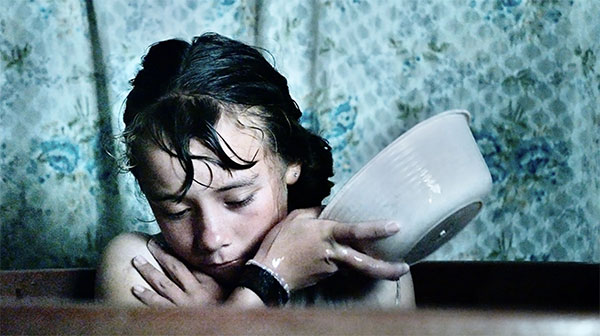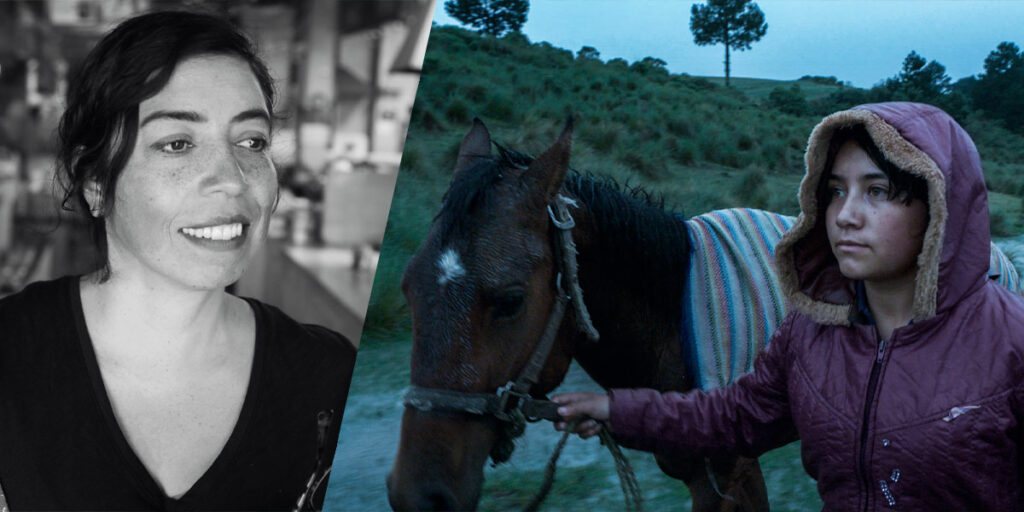At Berlin Film Festival, we sat down with Tatiana Huezo for an interview about The Echo, her evocative, enchanting documentary about a small Mexican village.
After her move away from the documentary form with her narrative feature Prayers for the Stolen (Noche de Fuego), Tatiana Huezo returns to the genre with The Echo (El eco), her mesmerising mosaic of children and adults in rural Mexico. Screening in the Encounters section at the 73rd Berlinale, The Echo is a divine documentary, with striking, mystical visuals and an unintrusive observational eye. The result is potent and invigorating.
The village in question is that of El Eco, located in Puebla within the Mexican highlands. Huezo shows the different families of this small place and their relationships, as well as how the natural world and its changing conditions affect their daily lives. With no strict narrative, The Echo dreamily forms into a series of vignettes, tied together by the world and experiences of the people within it. Huezo navigates this setting without intrusion and through the viewpoint of the children of El Eco. Their unique outlook on death, unbridled amazement at nature, and struggles even at such a young age make for an enthralling, touching experience. Metaphysical elements of haunting fantasy infuse into The Echo’s documentary form, whilst Huezo still maintains the humanistic grounding that has always provided the basis for her films.
After The Echo’s release at Berlin Film Festival, we sat down for an interview with director Tatiana Huezo, who also wrote the screenplay, co-edited and co-produced the film, to discuss this striking documentary. We spoke about how her creative process, how she found El Eco, and how her previous work influenced her latest film. Read our full interview with Tatiana Huezo below.
FINDING EL ECO: TATIANA HUEZO ON HOW THE ECHO FORMED
Thank you for speaking to us today. I saw The Echo on Thursday and loved it so much. What was your creative process for the film?
Tatiana Huezo: I felt a huge need to create a film based on childhood. That is the moment when so much happens that will mark you for the rest of your life. I particulary had an interest in rural life. It’s a place where children grow up and become adults very quickly, because they have to take on a lot of responsibilities, even when they are so young.

I also wanted to talk about Mexico from another viewpoint and from a different place. Prayers for the Stolen and my other previous films deal with this injury in Mexico, one caused to violence, kidnapping, and drug trafficking. Within all of that, there is the vulnerability of women.
My soul needed something different. The Echo has a little bit of this violence, but the focus is on taking care of the land and soil, and the education of children. This rural life is so astonishing that it continues at the same time as all of these difficulties.
How did you find the village, El Eco?
TH: I started by looking for rural schools set up in marginal areas. There is an organisation of teachers that work around there and helped me. It took me around six months to find El Eco. I saw the list of village names in this area and that name struck me. I was captured by it.
When I went there, there was just one room for the primary children. I found Luz Ma, the young girl who is taking care of the sheep, and she was tutoring two of the twins from the film. These twins were mirroring one another, which felt like a signal to make the film here. I also met a woman who told me stories about ghosts. She told me that in El Eco, stones would talk, and that when the wind blows, it carries the voices of them in the valley. You have to be careful, because everyone can listen to what you say! The search was over. I’d found what I was looking for.
FACT OR FICTION: TATIANA HUEZO ON TRANSITIONING BETWEEN GENRES
Last year, you made Prayers for the Stolen, a fiction film. Before that you’d directed a lot of documentaries, and now with The Echo, you’ve gone back to this genre. What made you transition between these two forms? What was this process like?
Tatiana Huezo: I come from documentaries, and when I did Prayers for the Stolen, I entered this huge production process! You have something like 100 people in the crew and new departments like makeup and special effects. Everything is new. It was huge, with respect to documentaries.
Since my very first film, I have always used a language that is very experimental, and I’ve always looked for something that is part of fiction in the creation of characters. I always write my scripts in advance, so I’ve never been that far from the process of creating fiction, but The Echo is the exception. After Prayers for the Stolen, I needed to stop this process. It takes a huge amount of money and time. I wanted to go back, put my feet on the ground, and be in touch with the people, to live their lives, enter their skin, and feel what they feel. That is the real food for my creative process, either with documentaries or fictional films.
But I do feel very comfortable moving between genres. To be honest, there is not a great difference between them, not in content, nor in aesthetic terms. They are very close in their emotional journeys, their senses, and walking into the skins of characters.
THE VISUAL & AURAL: THE SENSORY STRENGTH OF THE ECHO
You capture El eco and the surrounding world in a very engaging and sensory based way. How did you achieve this very detailed depiction?
TH: Prayers for the Stolen was very important for The Echo. It made me more courageous and made me try new things. In The Echo, there is no voiceover, no interviews. After Prayers for the Stolen, I wanted to experiment and use what I learned from this film to capture moments of pure feeling.
I was able to go further with the aesthetics. We did a lot of work on sound, which is much more powerful than in my previous films. It was a challenge to create and represent the sounds of the animals, of the night, of the mysteries of the stories, of the changing nature and seasons. I worked with Ernesto Pardo [cinematographer on The Echo] and the film became a huge work visually speaking. The real challenge was to create the place as a living being, to encompass everything in the landscape and all of its changes. We also focussed on portraying faces and how they look at this world. It was also challenging to film inside the interiors without violating the intimacy.
I learned a lot from Prayers for the Stolen and put it into The Echo.
This interview has been edited for length and clarity.
The Echo premiered at the Berlin Film Festival on February 17-26, 2023 and will be released in UK cinemas on July 26, 2024. Read our review of The Echo!

